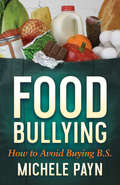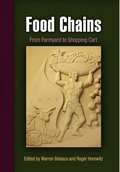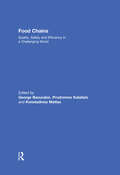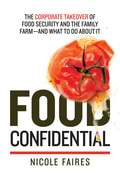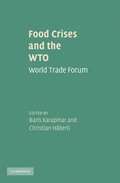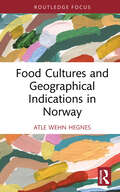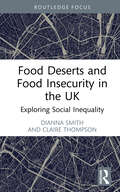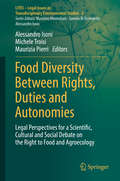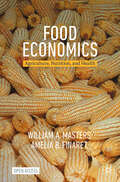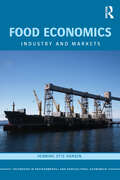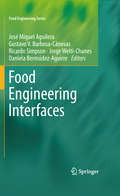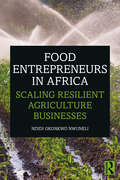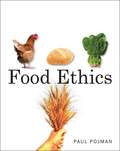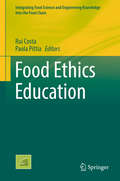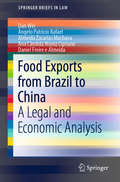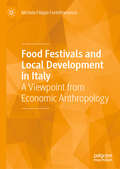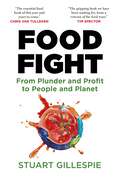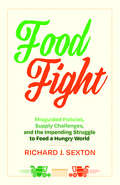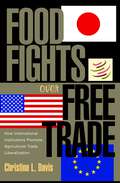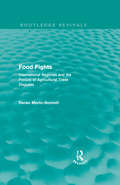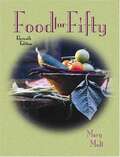- Table View
- List View
Food Around the World: A Cultural Perspective
by Margaret Emeritus McWilliamsFood Around the World: A Cultural Perspective, 4e is a unique and fascinating text examining the geography, history, economic, religious, and cultural factors influencing food consumption and availability. Appropriate for all students, especially those in food science, dietetics, and nutrition, it examines cultural food patterns and fosters an appreciation for various regions, nations, and cuisines. Chapters explore how and why different regions developed their unique cuisines and include recipes from each region. Vivid maps and photographs bring global cultures and foods to life as students travel through each chapter. Extensive learning tools help students master material and make the text an instructor-friendly resource.
Food Bullying: How to Avoid Buying B.S.
by Michele Payn&“A much-needed critique of our national obsession of guilt over food choices…exposes the multi-trillion-dollar marketing and misrepresentation of food.&”—Dr. David Samadi, urologic oncologist and world-renowned robotic surgeon IPPY Award Gold Medal Winner More than 40,000 products can be found in a grocery store—and there&’s a lot of money to be made by those who use misleading marketing to push us into emotion-driven decisions or make us feel like every purchase is a moral or social statement.Food Bullying upends the way you think about food and gives you permission to make eating choices based on your own social, ethical, environmental, and health standards—rather than brand, friend, or Facebook claims. Michele Payn, one of North America&’s leading voices in connecting farm and food, takes a startling look at the misrepresentation of food and sheds light on bogus nutrition and environmental claims to help you recognize and stand up to the bullies. Food Bullying guides you through understanding food label claims and offers insight on &“the hidden world of farming&”. Armed with science and a lifetime on the farm, Michele provides a six-step action plan for you to overcome food bullying, simplify safe food choices, and even save time in the grocery store. &“Engages and enables readers to overcome their fear to make shopping, food preparation and eating enjoyable endeavors rather than a battleground.&”—Leslie Bonci, MPH, RDN, CSSD, LDN, Kansas City Chiefs Sports Dietitian
Food Chains
by Roger Horowitz Warren BelascoIn recent years, the integrity of food production and distribution has become an issue of wide social concern. The media frequently report on cases of food contamination as well as on the risks of hormones and cloning. Journalists, documentary filmmakers, and activists have had their say, but until now a survey of the latest research on the history of the modern food-provisioning system--the network that connects farms and fields to supermarkets and the dining table--has been unavailable. In Food Chains, Warren Belasco and Roger Horowitz present a collection of fascinating case studies that reveal the historical underpinnings and institutional arrangements that compose this system.The dozen essays in Food Chains range widely in subject, from the pig, poultry, and seafood industries to the origins of the shopping cart. The book examines what it took to put ice in nineteenth-century refrigerators, why Soviet citizens could buy ice cream whenever they wanted, what made Mexican food popular in France, and why Americans turned to commercial pet food in place of table scraps for their dogs and cats. Food Chains goes behind the grocery shelves, explaining why Americans in the early twentieth century preferred to buy bread rather than make it and how Southerners learned to like self-serve shopping. Taken together, these essays demonstrate the value of a historical perspective on the modern food-provisioning system.
Food Chains: Cooperative Approaches For A Changing World (Cooperative Management Ser.)
by Konstadinos Mattas George Baourakis Prodromos KalaitzisFood Chains: Quality, Safety and Efficiency in a Challenging World addresses the many issues facing European food producers and other food chain stakeholders, who endeavour to improve their competitive position in a highly competitive world food market. The Food Chain is one of the main economic pillars in Europe, providing employment and opportunities for economic development in rural areas. It is therefore imperative to continuously monitor the changes that affect the sector, in order to allow stakeholders to respond promptly and effectively to the new market conditions. Adjusting to the new market involves new technology, globalization, demographic and social changes within a challenging market environment. In order to adopt these new market parameters, food chain stakeholders need to adapt their activities in order to gain in terms of effectiveness and efficiency.This book was originally published as a special issue of Food Economics - Acta Agriculture Scandinavica, Section C.
Food Confidential: The Corporate Takeover of Food Security and the Family Farm?and What to Do About It
by Nicole FairesFight the power and protect your family from the corporate interests that control our food chain. When author and homesteader Nicole Faires decided to retrofit an old school bus and tour America’s small farms with her husband and two small children, she expected to learn a lot, be inspired, and have some fun. But what she found disturbed her. Mismanaged small farms; clueless urbanites setting up shop to "get back to the land”; a mindless devotion to organic farming; and, ultimately, the discovery of just how dependent we are on corporations for our food. She began to understand how dangerous and fragile our food system really is. Climate change. Farmers retiring or going out of business. Corporations controlling our food distribution system while being protected from the consequences when they endanger our health. Skyrocketing food prices. Outsourced food production. With this admittedly bleak assessment of the current state of affairs, Nicole and her family decided to abandon the bus trip and instead start a farm. "I couldn’t tell people the solutions to our food crisis while I was traipsing around America taking photos. I had to live it,” Nicole says. And so the seeds for Food Confidential were sown. Our basic right to healthy food is at risk. What can we do? Written in an astute, engaging style, armed with examples from her own homesteading lifestyle, small farmer Nicole Faires’s Food Confidential gives you the tools to fight the intangible battles, as well as the practical ones.
Food Consumer Science
by Dominique Barjolle Jasna Milošević Đorđević Žaklina Stojanović Matthew GortonThis book explores the main methods, models, and approaches of food consumer science applied to six countries of the Western Balkans, illustrating each of these methods with concrete case studies. Research conducted between 2008 and 2011 in the course of the FOCUS-BALKANS project forms an excellent database for exploring recent changes and trends in food consumption.
Food Crises and the WTO
by Baris Karapinar Christian HäberliThe food and financial crises of 2008 and 2009 have pushed millions more people into poverty and hunger, while changing the parameters of international trade. Both crises have also challenged the fundamentals of WTO rules regulating agriculture, which had been designed to combat trade distortions due to artificially low-priced food commodities. This collection of essays examines to what extent the multilateral trading system contributes to food security in today's volatile markets. Bringing together a renowned group of expert economists, lawyers, environmental and development specialists, it offers a fresh and multi-dimensional perspective combining a strong economic analysis with a comprehensive legal assessment of the interface between food security and international trade regulation. Together, the contributions provide concrete policy recommendations on how the WTO could play a positive role in preventing or mitigating future food crises and promote global food security.
Food Cultures and Geographical Indications in Norway (Routledge Focus on Environment and Sustainability)
by Atle Wehn HegnesThis book analyses the implementation and challenges of using Geographical Indications in Norway. Adapting the modern and global system of Geographical Indications (GIs) to food cultures is a recurring challenge. This text uses Norway as a case study to describe, understand, and explain the socio-cultural adaptation of GIs. The empirical analysis shows that administrators, producers, consultants, and others make a significant effort to adapt the scheme to Norwegian food culture and the food culture to the scheme. Through the development and use of a new conceptual framework, the book continues to show how adaptations occurred and their influence on the development of the Norwegian food culture. The author also reflects upon the status of Norwegian GIs in emerging food cultural contexts related to sustainable and technology change. In summary, this book exhibits the connection between modern global legislative arrangements and traditional local products, providing a springboard for further research on cultural adaptation work of GIs in established and future global food cultures. This book will be of interest to researchers, policymakers, and students in agri-food studies, sociology of food and agriculture, agricultural and rural development, and cultural studies.
Food Deserts and Food Insecurity in the UK: Exploring Social Inequality (Routledge Focus on Environment and Sustainability)
by Claire Thompson Dianna SmithThis book examines the social inequalities relating to food insecurity in the UK, as well as drawing parallels with the US. Access to food in the UK, and especially access to healthy food, is a constant source of worry for many in this wealthy country. Crises, such as the COVID-19 pandemic, have coincided with a steep rise in the cost of living, meaning household food insecurity has become a reality for many more households. This book introduces a new framework to examine the many influences on local-level food inequalities, whether they result from individual circumstances or where a person lives. The framework will allow researchers new to the field to consider the many influences on food security, and to support emerging research around different sub-topics of food access and food security. Providing a thorough background to two key concepts, food deserts and food insecurity, the book documents the transition from area-based framing of food resources, to approaches which focus on household food poverty and the rise of food banks. The book invites researchers to acknowledge and explore the ever changing range of place-based factors that shape experiences of food insecurity: from transport and employment to rural isolation and local politics. By proposing a new framework for food insecurity research and by drawing on real-world examples, this book will support academic and applied researchers as they work to understand and mitigate the impacts of food insecurity in local communities. This book will be of great interest to students and scholars of food and nutrition security, public health, and sociology. It will also appeal to food policy professionals and policymakers who are working to address social inequalities and improve access to healthy and nutritious food for all.
Food Diversity Between Rights, Duties and Autonomies: Legal Perspectives For A Scientific, Cultural And Social Debate On The Right To Food And Agroecology (Lites - Legal Issues In Transdisciplinary Environmental Studies #2)
by Alessandro Isoni Michele Troisi Maurizia PierriThe book reflects on the issues concerning, on the one hand, the difficulty in feeding an ever- increasing world population and, on the other hand, the need to build new productive systems able to protect the planet from overexploitation. The concept of “food diversity” is a synthesis of diversities: biodiversity of ecological sources of food supply; socio-territorial diversity; and cultural diversity of food traditions. In keeping with this transdisciplinary perspective, the book collects a large number of contributions that examine, firstly the relationships between agrobiodiversity, rural sustainable systems and food diversity; and secondly, the issues concerning typicality (food specialties/food identities), rural development and territorial communities. Lastly, it explores legal questions concerning the regulations aiming to protect both the food diversity and the right to food, in the light of the political, economic and social implications related to the problem of feeding the world population, while at the same time respecting local communities’ rights, especially in the developing countries. The book collects the works of legal scholars, agroecologists, historians and sociologists from around the globe.
Food Economics: Agriculture, Nutrition, and Health (Palgrave Studies in Agricultural Economics and Food Policy)
by William A. Masters Amelia B. FinaretFood Economics provides a unified introduction to the economics of agricultural production, business decisions, consumer behavior, and the government policies that shape our food system. This open access textbook begins with economic principles derived using graphical techniques to explain and predict observed prices, quantities, and other outcomes as a result of individual choices influenced by market structure and public policies. The second half of the book explores available data globally and for the US, covering a wide range of questions in agriculture and economic development, food marketing, and consumption. Food Economics and its accompanying online resources are designed for advanced undergraduate or introductory graduate courses in agriculture, food, and nutrition policy. The book covers the standard diagrams taught in principles-level courses, with concrete examples and practical insights regarding food production, consumption, and trade. Online resources include data sources, and course materials, including slides, exercises, exams, and answer keys.
Food Economics: Industry and Markets (Routledge Textbooks in Environmental and Agricultural Economics)
by Henning O. HansenFood and food markets still enjoy a pivotal role in the world economy and the international food industry is moving towards greater consolidation and globalization, with increased vertical integration and changes to market structure. Companies grow bigger in order to obtain economies of scale and issues and such as food security, quality, obesity and health are ever important factors. This book describes the link between food markets and food companies from a theoretical and a business economics perspective. The relationships, trends and impacts on the international food market are presented, and the topic is related to actual business conditions. Each chapter is accompanied by questions and assignments designed to help students in their learning. .
Food Engineering Interfaces
by Gustavo Barbosa-Canovas Daniela Bermudez Aguirre Jorge Welti-Chanes José Miguel Aguilera Ricardo SimpsonThe International Conference on Food Engineering is held every four years and draws global participation. ICEF 10 will be held in April 2008 in Chile with the theme of food engineering at interfaces. This will not be a typical proceedings with uneven contributions. Papers will be solicited from each plenary speaker plus two or three invited speakers from each topic and the goal is to publish a book that conveys the interdisciplinary spirit of the meeting as well as covers the topics in depth, creating a strong reference work. The idea is to explore how food engineers have to be prepared in years ahead not only to perform in their normal activities but also to engage in new challenges and opportunities that will make the profession more attractive, responsive, and able to create a larger impact. These challenges and opportunities are within the profession and at interfaces with other areas. A major role of engineers is to incorporate new knowledge into the profession and respond to practical needs. The goal is to explore how food engineers are integrating developments in the basic sciences of physics and chemistry, nutrition, informatics, material sciences, genomics (and other -omics), quality and safety, consumer behavior and gastronomy. Interfaces with the environment, the business sector, regulations and export markets are also important to consider.
Food Entrepreneurs in Africa: Scaling Resilient Agriculture Businesses
by Ndidi Okonkwo NwuneliEntrepreneurs are the lifeblood of the agriculture and food sector in Africa, which is projected to exceed a trillion dollars by 2030. This book is the first practical primer to equip and support entrepreneurs in Africa through the process of starting and growing successful and resilient agriculture and food businesses that will transform the continent. Through the use of case studies and practical guidance, the book reveals how entrepreneurs can leverage technology and innovation to leapfrog and adapt to climate change, ensuring that Africa can feed itself and even the world. The book will: Inspire aspiring entrepreneurs to start and grow resilient and successful businesses in the agriculture and food landscapes. Equip aspiring and emerging entrepreneurs with practical knowledge, skills, and tools to navigate the complex agriculture and food ecosystems and develop and grow high-impact and profitable businesses. Enable aspiring and emerging entrepreneurs to develop scalable business models, attract and retain talent, leverage innovation and technology, raise financing, build strong brands, shape their ecosystem, and infuse resilience into every aspect of their operations. The book is for aspiring and emerging agribusiness entrepreneurs across Africa and agribusiness students globally. It will also inspire policymakers, researchers, development partners, and investors to create an enabling and supportive environment for African entrepreneurs to thrive.
Food Ethics
by Paul PojmanThis text provides an introduction to the complex issues arising from the question, "How should we eat?" Food Ethics has become one of the central fields within Environmental Ethics, developing to the point where it can be considered its own field. Three of the early issues at the core of 1960's and 70's environmentalism, animal rights, population and consumption dynamics, and toxic pollutants, form the center of modern food ethics debates, but new questions have also arisen, responding to developments in both food technologies and the globalization of land use.
Food Ethics Education
by Rui Costa Paola PittiaThe book is divided in 3 sections, each containing several chapters: Section 1 includes chapters that identify and discuss several ethical issues along the food chain, with particular detail of issues in the food industry and in consumer behavior; Section 2 includes chapters that present the basis of a code of conduct in the food profession as well as the description of existing codes of conduct of food industry and food scientist professionals, including ethics of publishing, and also ethics in risk communication; Section 3 includes chapters based on case studies with examples of teaching approaches currently used in teaching food ethics, easy to implement and already tested and confirmed as successful examples that engage students in this topic. Although professional ethics in food supply chain is claimed as an essential topic to be addressed in any degree program, few higher education institutions that currently include a module on ethics in their study programs. In g eneral, it is argued that ethics is a topic addressed along the curriculum and embedded in the contents of the modules. However, ethics, for its importance, needs a different teaching and educational approach, and this book achieves that. .
Food Exports from Brazil to China: A Legal and Economic Analysis (SpringerBriefs in Law)
by Dan Wei Ângelo Patrício Rafael Almeida Zacarias Machava Ana Cândida Muniz Cipriano Daniel Freire e AlmeidaThis book provides an essential overview of trade between Brazil and China, analyzes the regulatory framework for Brazil’s foodstuff exportation and China’s foodstuff importation, and identifies the main products, market shares, barriers to market access, and e-commerce strategies. The book also addresses the importance of consumer health and the latest developments regarding the United Nations Guidelines for Consumer Protection. Lastly, based on the statistics for Brazil’s food exports to Mainland China, Hong Kong and Macau as separate customs areas, the book explores the role of Macau and calls for intensifying its links with Portuguese-speaking countries, including Brazil.
Food Festivals and Local Development in Italy: A Viewpoint from Economic Anthropology
by Michele Filippo FontefrancescoWhat does the proliferation of food festival tell us about rural areas? How can these celebrations pave the way to a better future for the local communities? This book is addressing these questions contributing to the ongoing debate about the future of rural peripheries in Europe.The volume is based on the ethnographic research conducted in Italy, a country internationally known for its food tradition and one of the European countries where the gap between rural and urban space is most pronounced. It offers an anthropological analysis of food festivals, exploring the transformational role they have to change and develop rural communities. Although the festivals aim mostly at tourism, they contribute in a wider way to the life of the rural communities, acting as devices through which a community redefines itself, reinforces its sociality, reshapes the perception and use of the surrounding environment. In so doing, thus, the books suggests to read the festivals not just as celebrations driven by food fashion, but rather fundamental grassroots instruments to contrast the effects of rural marginalization and pave the way to a possible better future for the community
Food Fight: From Plunder and Profit to People and Planet
by Stuart GillespieUsing decades of research and insight gathered from around the world, health and nutrition expert Stuart Gillespie reimagines our global food system, plotting a way forward for a sustainable, equitable, and healthy food future Food is life, but our food system is killing us. Designed in a different century for a different purpose—to mass-produce cheap calories to prevent famine—it’s now generating obesity and ill-health and driving the climate crisis. We need to transform it into one that can nourish all eight billion of us and the planet we live on. In Food Fight, Stuart Gillespie shares the insights he’s gleaned over a forty-year career in food, nutrition, and health, revealing how the global food system we once relied upon for nutrition has warped into the very thing making us sick. Many of us are now simultaneously overweight and undernourished. From its origins in colonial plunder through to the past few decades of neo-liberalism, our food system now lies in the tight grip of a handful of powerful transnational corporations that are playing for profit at any cost—aided by governments who let them get away with it. With his eye trained on solutions within our grasp, Gillespie also celebrates success stories from around the world, driven by remarkable citizens, social movements, policy makers, and politicians. These case studies offer hope that, by organizing, sharing, and learning, we can build a better food future for ourselves and for our children. Both unflinching exposé and revolutionary call to arms, Food Fight shines a light inside the black box of politics and power before mapping a way toward a new system that gives us hope for a future of global health and justice.
Food Fight: GMOs and the Future of the American Diet
by Mckay JenkinsAre GMOs really that bad? A prominent environmental journalist takes a fresh look at what they actually mean for our food system and for us. In the past two decades, GMOs have come to dominate the American diet. Advocates hail them as the future of food, an enhanced method of crop breeding that can help feed an ever-increasing global population and adapt to a rapidly changing environment. Critics, meanwhile, call for their banishment, insisting GMOs were designed by overeager scientists and greedy corporations to bolster an industrial food system that forces us to rely on cheap, unhealthy, processed food so they can turn an easy profit. In response, health-conscious brands such as Trader Joe’s and Whole Foods have started boasting that they are “GMO-free,” and companies like Monsanto have become villains in the eyes of average consumers.Where can we turn for the truth? Are GMOs an astounding scientific breakthrough destined to end world hunger? Or are they simply a way for giant companies to control a problematic food system? Environmental writer McKay Jenkins traveled across the country to answer these questions and discovered that the GMO controversy is more complicated than meets the eye. He interviewed dozens of people on all sides of the debate—scientists hoping to engineer new crops that could provide nutrients to people in the developing world, Hawaiian papaya farmers who credit GMOs with saving their livelihoods, and local farmers in Maryland who are redefining what it means to be “sustainable.” The result is a comprehensive, nuanced examination of the state of our food system and a much-needed guide for consumers to help them make more informed choices about what to eat for their next meal. From the Hardcover edition.
Food Fight: Misguided Policies, Supply Challenges, and the Impending Struggle to Feed a Hungry World
by Richard J. SextonSociety's most basic challenge is arguably to produce and distribute enough food for its citizens. In 2023, 733 million people faced hunger and 2.3 billion were moderately or severely food insecure. Feeding a growing world population is becoming more difficult in the face of climate change, pest resistance to traditional treatments, and misguided government policies that limit how much food ends up on our plates. Policies to support biofuels, organic agriculture, local foods, and small farms and to oppose genetically modified foods all reduce food production on existing land. This leads to higher food prices, increased carbon emissions, and less natural habitat as cropland expands. Food Fight documents the challenges to adequately feeding the world in the twenty-first century and illustrates the ways in which contemporary food policies in the United States, Europe, and beyond imperil food security. Richard J. Sexton provides a window into the world of modern agriculture and food supply chains. He separates the wheat from the chaff to distinguish policies that will limit, or expand, the global food supply, and he explains how we can construct a food system that forestalls future hunger and environmental degradation.
Food Fights over Free Trade: How International Institutions Promote Agricultural Trade Liberalization
by Christina L. DavisThis detailed account of the politics of opening agricultural markets explains how the institutional context of international negotiations alters the balance of interests at the domestic level to favor trade liberalization despite opposition from powerful farm groups. Historically, agriculture stands out as a sector in which countries stubbornly defend domestic programs, and agricultural issues have been the most frequent source of trade disputes in the postwar trading system. While much protection remains, agricultural trade negotiations have resulted in substantial concessions as well as negotiation collapses. Food Fights over Free Trade shows that the liberalization that has occurred has been due to the role of international institutions. Christina Davis examines the past thirty years of U.S. agricultural trade negotiations with Japan and Europe based on statistical analysis of an original dataset, case studies, and in-depth interviews with over one hundred negotiators and politicians. She shows how the use of issue linkage and international law in the negotiation structure transforms narrow interest group politics into a more broad-based decision process that considers the larger stakes of the negotiation. Even when U.S. threats and the spiraling budget costs of agricultural protection have failed to bring policy change, the agenda, rules, and procedures of trade negotiations have often provided the necessary leverage to open Japanese and European markets. This book represents a major contribution to understanding the negotiation process, agricultural politics, and the impact of international institutions on domestic politics.
Food Fights: International Regimes and the Politics of Agricultural Trade Disputes (Routledge Revivals)
by Renée Marlin-BennettFirst published in 1993, this title explores the underlying ideologies and decision-making procedures that codify the rules of the post-World War II liberal, now defunct Soviet socialist, mercantilist and South preferential trade regimes. Food Fights presents a rich case study and rigorous data analysis of organised agrictultural trade that uncovers similarities between these diverse economic systems and identifies the principle trends governing the new global economy.
Food For Fifty
by Mary K. MoltFor courses in Quantity Food Production and Foodservice Management. <p><p> THE resource--for over 65 years--for students and professionals in quantity food production and foodservice management. Exceptionally comprehensive, this classic text/reference provides basic technical food production information; offers a wealth of high-quality, standardized, quantity recipes applicable to most types of foodservices; and clearly explains the full range of generally accepted procedures and techniques involved in quantity food preparation. Very contemporary in perspective, it provides a host of “new tools” for helping food professionals and students meet quickly changing dining trends and satisfy the expectations of today's customer.
Food For Today (8th edition)
by Helen Kowtaluk Alice Orphanos KopanThis leading program goes beyond the basics of nutrition, consumer skills, and food preparation to include current coverage of Food Science, Global Foods, Safety, Wellness, and more.

